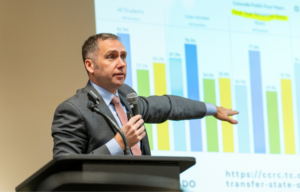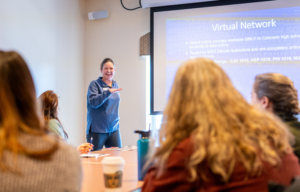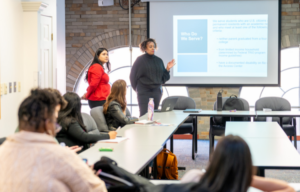
Metropolitan State University of Denver recently hosted more than 100 education partners, including representatives from seven local community colleges, as a part of the University’s 2030 Strategic Plan, to provide an ideal transfer-student experience. MSU Denver brought collaborators together to identify barriers that transfer students face at all levels of the process and discuss ways to eliminate them.
“For transfer students, this begins when they are at the community college,” said Megan Scherzberg, Ph.D., executive director of Orientation, Transfer and Reengagement. “By hosting the Transfer Champion Symposium, we hoped to strengthen partnerships with community colleges and share information related to transfer-student enrollment and best practices with folks who are in front of transfer students at the community colleges each and every day.
“Hosting an event that incorporated faculty and staff members across MSU Denver and community-college partners allowed us to look at data and policies related to transfer-student success and consider opportunities to improve transfer-student enrollment and graduation rates.”
Frequent barriers
One of the largest barriers transfer students face is that many institutions have courses that don’t transfer at equal proportions or can be applied only as electives. This forces students to delay the completion of their degree and often makes it more expensive.

By the numbers
Only about 20% of students transfer to a four-year university after attending their first college. Despite that low rate, transfer students often have the highest tangible success once at their destination university. While only about 11% of students earn a bachelor’s degree at their initial school, upward of 80% of transfer students graduate.
See more statistics on what MSU Denver’s transfer students look like.
How MSU Denver is leading the way
MSU Denver has already contributed to improving the transfer process. As an institution that receives more Colorado Community College students than any other, the University has identified services and resources to ensure that every Roadrunner can make it to the finish line.
Transferology
Transferology is a free tool that allows anyone to review the credit value of past courses at any future institution. This helps students at local community colleges see how their courses, exams, military experience and life learning experiences transfer to MSU Denver.
Finish What You Started
The Finish What You Started program is for students who have been out of college for at least two semesters, have recently experienced financial hardship due to the pandemic and are on track to graduate by 2026. Qualifying students will receive $1,000 for each enrolled semester and holistic support to earn their degree.
TRIO Student Support Services

This program helps first-generation, low-income and disabled students build a foundation for academic success that launches members toward leadership in the classroom and their chosen careers.
It provides academic coaching and support, peer mentorship, financial assistance and education, in-demand career skills and graduate school preparation, connection to campus resources and more.
Visit the TRIO SSS website to see program requirements and how to apply.
Reisher Scholarship
Funding is an issue as old as time when students look at the logistics of achieving desired degrees. Reisher scholar representatives were present at the Transfer Champion Symposium to offer a concrete solution to this challenge: a need-and-merit-based scholarship that offers three years of support to rising sophomores or two years to incoming transfers. Scholars receive up to $15,000 each academic year.
Ways employees can help
Every employee can positively impact the transfer experience, even if they don’t work directly with transfer students.
- Learn the unique needs of transfer students and consider those needs when reviewing or developing policies, processes and curriculum.
- Talk to the student employees in your office/department. There’s a good chance one of them is a transfer student at MSU Denver and can share insight on ways your office can contribute to the transfer experience.
- Join the Transfer Advocacy Group, a combination of faculty and staff members across campus who meet monthly to identify the needs of transfer students and opportunities to better support transfer-student success. Contact Scherzberg for more information.
- Meet with Transfer Champions across campus. If you’re unsure about how your office or department can contribute to the success of transfer students, ask the experts.
In case you missed it
If you were unable to attend the Transfer Champion Symposium, take a look at the breakout sessions to see what you missed and whom to contact for additional information.

